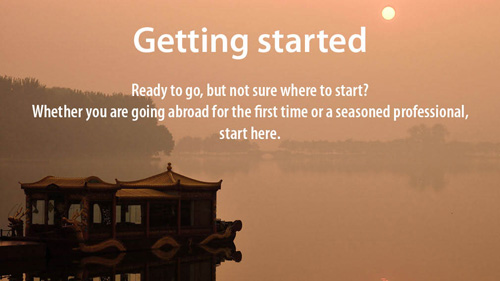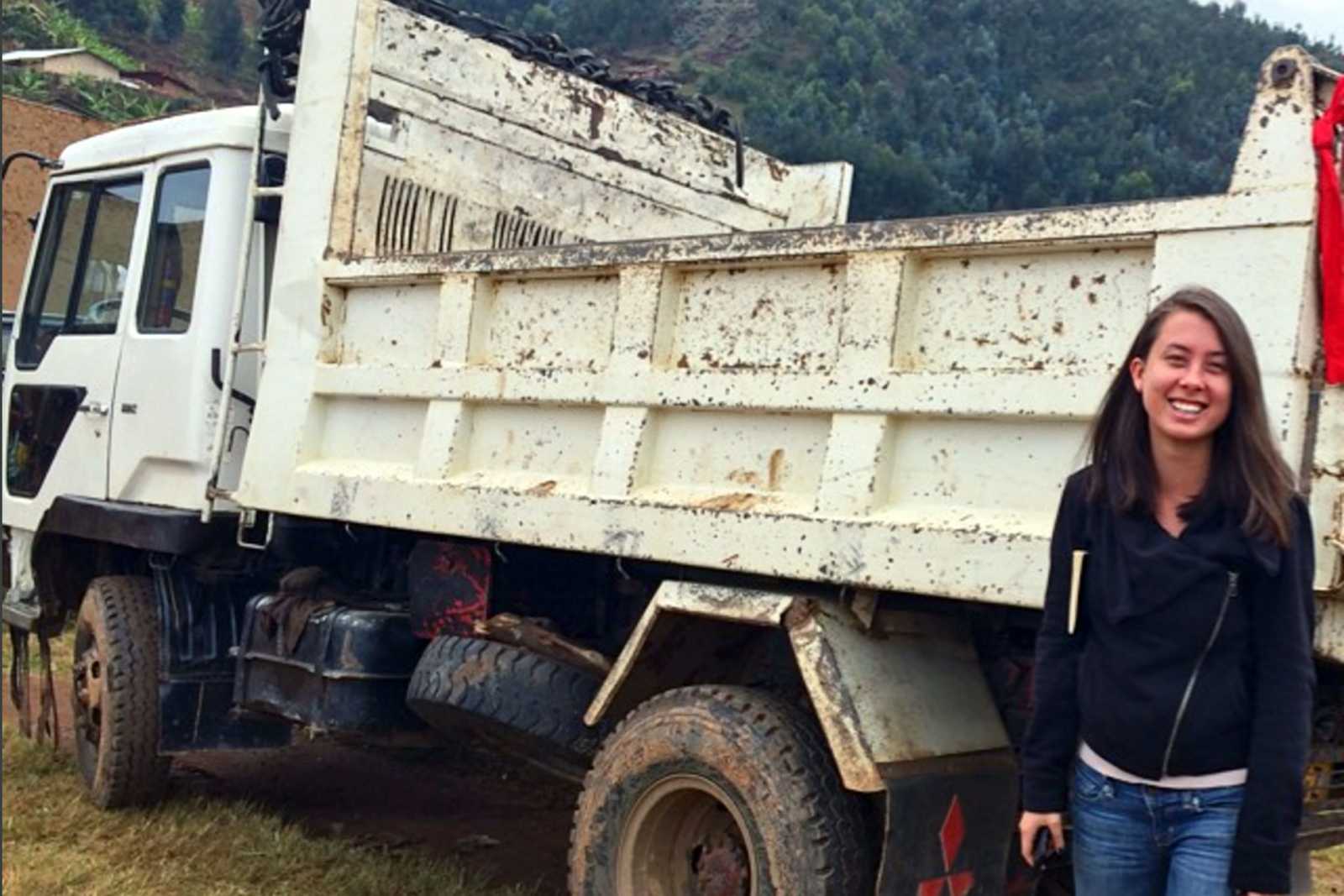- Name: Cher-Wen DeWitt
- Age: 27
- Home town: Big Island, Hawaii, USA
- Education: BA Neuroscience, Oberlin College
- Current position: Microfinance Partnerships Analyst, One Acre Fund
- Bio: Logistics and Agro Dealer Program Manager, One Acre Fund Rwanda; Country Director, FACE AIDS Rwanda
- Years in the field: 7
- Countries I've worked in: Kenya, Rwanda
- Sector / subsectors: Agriculture, Environment, Business
- Country: Kenya, Rwanda
- Region: Africa
- Sector: Agriculture, Business, Environmental, International development
- Degree subject: Neuroscience, Sciences
What does your organization do?
One Acre Fund supplies smallholder farmers with the financing and training they need to grow their way out of hunger and poverty. Instead of giving handouts, we invest in farmers to generate a permanent gain in farm income. We provide a complete service bundle of seeds and fertilizer, financing, training, and market facilitation—and we deliver these services within walking distance of the 400,000 rural farmers we serve.
Can you please describe your current position? What are your day-to-day tasks or responsibilities? How does your role fit within the goals of your organization?
I work on One Acre Fund's Microfinance Partnerships Team. Our focus is on the smallholder finance gap; less than one-sixth of the over $200 billion of demand for smallholder farmers is being met. Our program is scaling rapidly to address this, but moving the needle for substantial change will involve many actors within the microfinance sector.
I work with my teammates to scout microfinance organizations around the world that are employing innovative approaches to smallholder finance, and who value farmers as important clients. Once these organizations are identified, we aim to create connections between them, highlighting opportunities for partnership or collaboration. If we assess that a program might benefit from collaboration with One Acre Fund, we can engage in operational partnership to help scale an existing farm finance product, or make it more robust.
This translates to a split in my work—half the time I'm based in New York City, contributing to my team's market research and sector engagement, which includes representing the organizations at conferences and supporting joint publications. The other half of the time, I travel to other countries to visit microfinance programs to develop detailed reports to raise the profile of their work. I also dedicate a significant portion of my time to operational partnerships—where I get to visit farmers who are clients of another program to find out what aspects of the finance available to them are working, and which are not. Ultimately, we can make recommendations to the institution based on this feedback. For example: “The clients would like to have training incorporated into an agriculture loan. Here are some tools and project processes we can provide you to incorporate that into a successful operation.”
Collaboration is always interesting; it challenges us to approach the client from another institution's point of view. This widens our perspective, and also creates unique opportunities for product and service innovation.
How did you get your job?
I had been in Rwanda for two years, based at a rural hospital, when I decided to transition to agriculture. In the community health work I had been doing at the time, the patients we interacted with were predominantly small farmers. Their vulnerability to health problems was almost always linked back to poverty and malnutrition; symptoms of insufficient harvests. I had become friends with several employees of One Acre Fund who convinced me to apply for a job, and I’ve been with the organization ever since.
I was very fortunate to gain experience at a project management level, which allowed me to learn everything from budget management to community health campaign rollout. At the bottom of it all, the work was varied and humbling—it kicked me in the pants, and I’m so grateful. At an early point in my career, it challenged me to be very honest with myself about the skills that I still needed to learn and how to ask for help from colleagues in areas where I had less experience.
What education do you think is most beneficial for work in this field?
I think that the scope of skill sets in agricultural development is incredibly broad, and beneficial educational backgrounds vary widely. I often get a puzzled head-tilt when I explain that my undergraduate degree was in neuroscience, but six years down the line, I work with farmers.
It’s a common misconception that you need a background in agronomy to work in agriculture, and while I hold those people in such high regard for their mastery of all things that grow, there are many other parts to play. For every agricultural system, there are people who need to balance budgets, manage warehouses, maintain fair and equitable hiring practices, motivate and train operations teams, and more—your skill set could be just what someone is looking for. As long as you’re willing to work hard and identify gaps in your skill set that you need to improve, you shouldn’t view your degree as a limitation.
What, in your experience, are the most important skills and abilities necessary to succeed in this career?
I think that both international development and agricultural development, project management skills will serve you well in any setting. You'll likely find yourself working in an organization or company that's a little armada of projects, trials and ongoing activities, where you're responsible for keeping your own boat afloat.
Balancing "what needs to get done now" with "what we're trying to accomplish in the long-term" is something to be constantly aware of, and work on improving over time. A particularly helpful exercise can be a post-mortem project review, which allows you to really zero in on what you did well, and where you and the rest of your team can improve in the future. While it seems natural to do this, often after you've closed a huge project, your first instinct will be to collapse in exhaustion. You should definitely find a way to recharge your batteries and treat yourself for completing the project, but it is important to get your team together for reflection while everything is still fresh in your minds. It's also a great opportunity to congratulate team members on things that were done well, and recognize their contributions to the finished product or outcome.
In my current role, understanding financial products and services has been very important. Specifically, seeing how elements of loan design influence client behaviour and the overall performance of the product is a skill I’m always working to improve.
How has your job allowed you to travel?
I had a few pivotal internships in college in Kenya that helped me decide to build my early career in East Africa. I had the good fortune to land a Global Health Corps Fellowship in Rwanda when I graduated from college and stayed there for five years.
My current position has me based in New York half the time, and travelling the rest of the time to countries where there are interesting things happening in smallholder farm finance. It’s an incredible opportunity to gain perspective on a global challenge, while staying very connected to the most important voices—the farmers who are gracious enough to welcome us into their homes and share their knowledge and opinions.
What do you enjoying the most about working abroad, both personally and professionally?
I really relish the opportunity to be made a fool of on a constant basis. When I get into my daily routine along familiar routes of comfort, it can be easy to feel like I “know things,” and there’s a complacency that comes with mastery of your own lifestyle. When I work in different countries, I’m constantly reminded how much I’ve yet to learn.
Recently, in Tanzania, an elderly farmer asked me if I really knew how difficult it was to hoe three acres of land by hand. I had to admit that, despite working in this sector for a few years, I had no idea what it was like to work as hard as this man and certainly couldn’t comprehend a lifetime of it. He went door-to-door to find a jembe (hand hoe) and made me work a little patch of land in front of everyone, who split into fits of giggles at my inefficiency. It was an important moment; it can be easy to feel like you know a lot when you’re the one carrying a clipboard or typing notes furiously on your laptop, but you’re really there to learn.
What have been some of the personal challenges that you’ve faced while working overseas?
I’ve struggled from time to time with being far from family. It’s a challenge a lot of people hit when they spend more than a few years away from home, and I haven’t been immune. I’m very lucky to have family that has encouraged me to take advantage of opportunities for travel, and they have never once questioned the value of my career choices. My parents both moved away from home early in their lives, so I guess I’m cut from the same cloth.
It still doesn’t make it any easier when you want to get home in the event of an emergency or personal crisis, though. Those sacrifices are always tough, because they impact the people you love. At the bottom of it, I know that they want me to be happy and chasing challenges, so we make it work!
What are some professional challenges that you’ve encountered working cross-culturally?
It’s important to remind yourself not to take anything as a given. Particularly when you’re an expatriate, the onus is on you to constantly check to make sure you’re being understood, to sense-check your ideas, and to ask people what they think should be done.
I once developed an inventory management tool that made perfect sense to me at my desk, and rolled it out to thousands of members of my team only to realize that I had designed it without a full understanding of their time constraints and stock management realities. The tool was essentially useless, though my teammates were too polite to tell me at first. No matter what your professional skills are, anyone can be rendered a novice in an unfamiliar place. Ask questions constantly.
As someone who has found success working abroad, is there any advice you might have to offer those who are thinking of taking their career outside of their own country?
It can seem daunting to step out of your comfort zone geographically, culturally, and personally, but it also holds incredible rewards. I’ve been recently reminded how pivotal your mentors and peers are in professional development—it sounds trite, but it bears repeating.
When you look for an opportunity, ask yourself what kind of people you want to be surrounded with on the job and what kind of community you see yourself in. Those things can be even more important than finding a position in a particular interest area. A job might look great on paper in terms of subject matter, but you’ll find it hard to get much done without team rapport. When you work with the right people, all things are possible.
Add to Favorites


